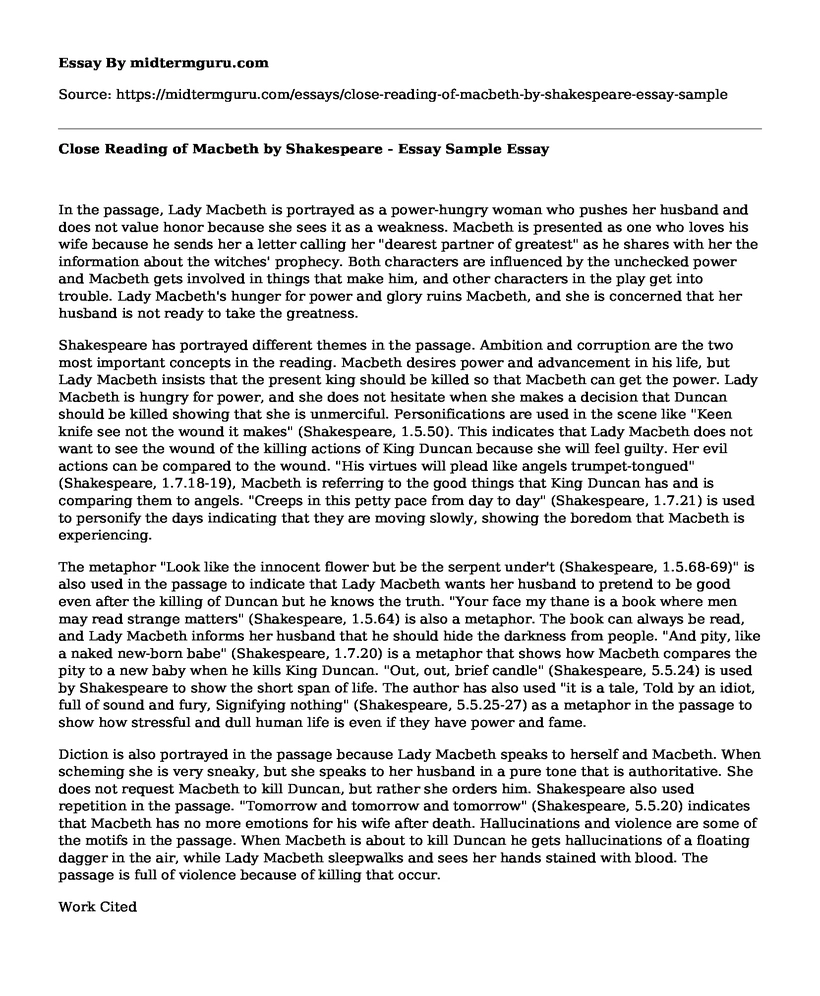In the passage, Lady Macbeth is portrayed as a power-hungry woman who pushes her husband and does not value honor because she sees it as a weakness. Macbeth is presented as one who loves his wife because he sends her a letter calling her "dearest partner of greatest" as he shares with her the information about the witches' prophecy. Both characters are influenced by the unchecked power and Macbeth gets involved in things that make him, and other characters in the play get into trouble. Lady Macbeth's hunger for power and glory ruins Macbeth, and she is concerned that her husband is not ready to take the greatness.
Shakespeare has portrayed different themes in the passage. Ambition and corruption are the two most important concepts in the reading. Macbeth desires power and advancement in his life, but Lady Macbeth insists that the present king should be killed so that Macbeth can get the power. Lady Macbeth is hungry for power, and she does not hesitate when she makes a decision that Duncan should be killed showing that she is unmerciful. Personifications are used in the scene like "Keen knife see not the wound it makes" (Shakespeare, 1.5.50). This indicates that Lady Macbeth does not want to see the wound of the killing actions of King Duncan because she will feel guilty. Her evil actions can be compared to the wound. "His virtues will plead like angels trumpet-tongued" (Shakespeare, 1.7.18-19), Macbeth is referring to the good things that King Duncan has and is comparing them to angels. "Creeps in this petty pace from day to day" (Shakespeare, 1.7.21) is used to personify the days indicating that they are moving slowly, showing the boredom that Macbeth is experiencing.
The metaphor "Look like the innocent flower but be the serpent under't (Shakespeare, 1.5.68-69)" is also used in the passage to indicate that Lady Macbeth wants her husband to pretend to be good even after the killing of Duncan but he knows the truth. "Your face my thane is a book where men may read strange matters" (Shakespeare, 1.5.64) is also a metaphor. The book can always be read, and Lady Macbeth informs her husband that he should hide the darkness from people. "And pity, like a naked new-born babe" (Shakespeare, 1.7.20) is a metaphor that shows how Macbeth compares the pity to a new baby when he kills King Duncan. "Out, out, brief candle" (Shakespeare, 5.5.24) is used by Shakespeare to show the short span of life. The author has also used "it is a tale, Told by an idiot, full of sound and fury, Signifying nothing" (Shakespeare, 5.5.25-27) as a metaphor in the passage to show how stressful and dull human life is even if they have power and fame.
Diction is also portrayed in the passage because Lady Macbeth speaks to herself and Macbeth. When scheming she is very sneaky, but she speaks to her husband in a pure tone that is authoritative. She does not request Macbeth to kill Duncan, but rather she orders him. Shakespeare also used repetition in the passage. "Tomorrow and tomorrow and tomorrow" (Shakespeare, 5.5.20) indicates that Macbeth has no more emotions for his wife after death. Hallucinations and violence are some of the motifs in the passage. When Macbeth is about to kill Duncan he gets hallucinations of a floating dagger in the air, while Lady Macbeth sleepwalks and sees her hands stained with blood. The passage is full of violence because of killing that occur.
Work Cited
Shakespeare, William. Macbeth. San Diego, Calif: Huge Print Press, 2000. Print.
Cite this page
Close Reading of Macbeth by Shakespeare - Essay Sample. (2021, Jun 17). Retrieved from https://midtermguru.com/essays/close-reading-of-macbeth-by-shakespeare-essay-sample
If you are the original author of this essay and no longer wish to have it published on the midtermguru.com website, please click below to request its removal:
- Essay on Religion and Mythology in Ancient Times
- Englisf Literature Essay Sample: Hamlet Seeking Revenge for His Fathers Death
- The Hollow Men by Eliot - Poetry Analysis Paper Example
- Essay on Where Are You Going, Where Have You Been? by Joyce Carol Oates
- Comparison of Poems About Love - Paper Example
- Essay on Heart of Darkness by Joseph Conrad
- Literary Analysis Essay on Heinrich Heine's Loreley & Its Influence







